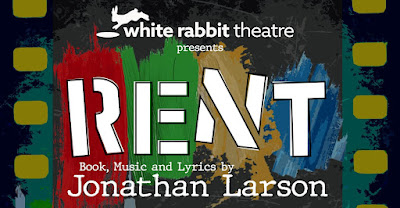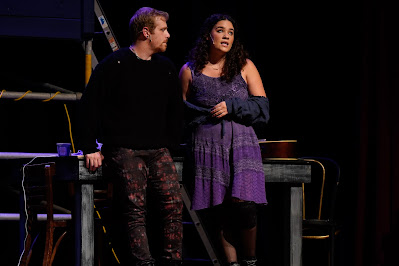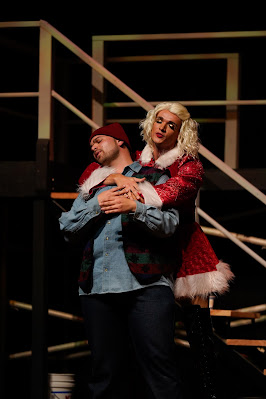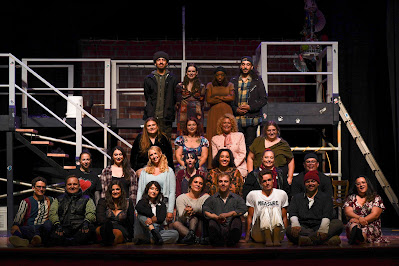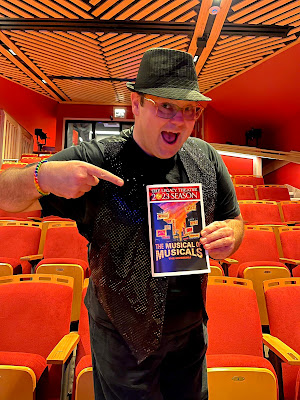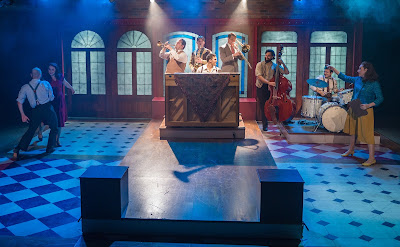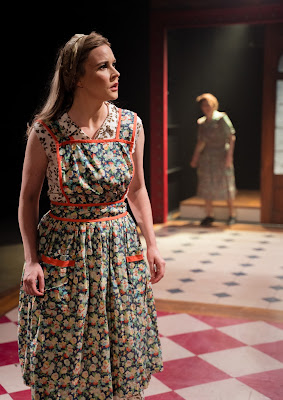By James V. Ruocco
Then, now, always.
The experience that is "Rent" - not just onstage but in the audience - is shaped by story, vocals, music, exchanges and characters that touch the heart, stir the senses, create an atmosphere of pure euphoria and produce lots and lots of wet tears for those willing to succumb to the musical's oft-told tale of triumph, adversity, friendship, life, death and bohemian camaraderie.
Twenty-seven years old, it remains a source of great joy, strength and opportunity.
It rocks effectively.
It tilts and spins.
It is unmistakably catchy, inspiring and timely.
It promotes diversity.
It's every bit as powerful as when it was first performed.
And like all great music or art, it has acquired a strong sense of history, rhythm and pulse that goes way beyond the Bohemian stratosphere from whence it came.
Five hundred twenty-five
Moments so dear
Five hundred twenty-five thousand
Six hundred minutes
How do you measure - measure a year?
In daylights - in sunsets
In midnight's - in cups of coffee
In inches - in miles
In laughter - in strife"
"Rent" was a Broadway musical, like no other.
Edgy.
Blatant.
Effective.
Revelatory.
Unhinged.
Sexual.
Prolific.
Winner of the 1996 Award for Best Musical and Best Musical Score, among others, "Rent" completely changed the face of musical theater - Broadway, West End, Fringe, Regional, National Tour - with an adrenaline-pumped, frenzied musical score of seamlessly mixed salsa, reggae, opera, gospel, tango, electric rock, pop and Sondheim-tinged eclecticism.
At Cheney Hall in Manchester, an inviting, elegant Victorian structure of brick and brownstone, White Rabbit Theatre's invigorating revival of the 1996 Tony Award winning musical, fills the historic venue with an immersive, in-the-moment exhilaration and celebratory, pseudo pop feel that not only pays homage to Jonathan Larson's vision, concept and blueprint for "Rent," but does full justice to his visionary story, his representation of different races, his colorful gay and straight characters, his contagious rock score and his overflowing sense of promise, hope, attitude and urban rawness.
The interpretation is new.
The direction is new.
The style, the staging, the twists, the ideas and the vision is new.
The costume design is new.
But this is "Rent" the way it was meant to be seen, enjoyed, performed and experienced.
It is bold and brazen.
It is focused and uplifting.
It is electric and connected.
It is raw and sexual.
It is urgent and romantic.
It dances to its own decided heartbeat.
It also has a mind of its own, as seen through the eyes of its extraordinary directors, Adam Tortorello and Lena Felix.
Its raw, necessary, stringent language ("fucking weird," "fucking bitch," "dildo," "clit club," "queer," for example), jump starts the storytelling, its musical format and its scene-by-scene progression without any form of hesitation, whitewashing, cop outs, editing or censorship. Here, the principal characters are full-on and reflective of their impoverished, quirky East Village milieu. Nothing is taken for granted, pumped up, overplayed, exaggerated or prettified. Everyone has his or her piece to sing or recite including Larson's wandering, perfectly integrated populate of parents, police officers, vendors, junkies, homeless people, beggars, waiters, pastors and AIDS-inflicted men and women clinging to a hope of a better tomorrow.
"La Vie Boheme," "Another Day," "One Song Glory," "Light My Candle," "Rent," "Out Tonight," "I'll Cover You," "You Okay, Honey," "Take Me or Leave Me," "Seasons of Love," "Without You," "I Should Tell You," "Santa Fe," "Christmas Bells," "Goodbye Love," "We're Okay," "Over the Moon," "What You Own," "Today 4 U," "Tango: Maureen," "Will I?" "Life Support," "Your Eyes."
Larson's recurring musical themes - living on the edge, taking chances, tragic losses, fighting for survival, a strong sense of community, death and adversity, homophobia, shielding loved ones from danger, unspoken truths - are emotionally sustained, addressed and melodically revisited in this eclectic WRT remounting which is musically directed by Marc Sokolson and band director/conductor Nick Stanford (doubling as keyboardist 1) alongside the talented, handpicked orchestral team of Maurice Thomas (Bass), Mike Bafuma (drums), Nick Zavaglia (guitar 1) and C. Descoutures (guitar 2, keyboardist 2).
A collaborative effort that gives way to a luxury outing of colorful, collective interludes, beats, rhythms and pulses, Sokolson and company fuel "Rent" with a dizzying, involved frenzy, fire and spirit that sets Larson's great musical artwork in motion. There's shimmer and grasp. There's lingering drama and resonance. There's rainbow flag theatricality. There's lift and challenge. There's punch and climax. There's variety and contact. There's warmth, ache, sorrow and presence.
Directorially, Tortorello and Felix come to this revival with a grab-bag of ideas, visions and staging maneuvers that heighten, strengthen and influence their reenactment of the popular musical. If you've seen "Rent" before ("Is there anyone out there who hasn't?"), this revival, though faithful, in part to Larson's original work, takes chances and occasional liberties with the play text while experimenting, exploring and filling in the dots with colors and shading that accentuates and improves the already familiar story and libretto.
As directors, and exceptionally talented ones at that, they are not interested in dusting off the blueprints of the 27-year-old musical, its revivals, its anniversary productions, its final tours or its subsequent by-the-book incarnations. Instead, they have looked for new ways to stage key story points, elements exchanges and situations of the popular musical. It's a directorial strategy that not only heightens and enlightens their telling of "Rent" but give it a shine and uniqueness all its own.
Reinterpreting the musical, they bring some of the upstage, elevated-tiered action - the AIDS-related encounter group sessions, for example - downstage, front and center - which, in turn, make these individual scenes much more powerful and effective. Elsewhere, Maureen's "Over the Moon" protest (based on the 18th century nursery rhyme "Hey, Diddle, Diddle") finds the character entering the arena from the rear of the Cheney Hall auditorium transporting two cows - one that's as big as the Milky White cow from "Into the Woods;" the other, a full-blown miniature white plastic replica she carries onstage. It's a three-dimensional directorial stroke that works splendidly and heightens both the over-the-top humor, unrest and tension of the piece tremendously. It also puts a lively spin on Maureen's cleverly staged infusion of fresh milk as she hilariously sucks the hell out of the cow's udder's savoring each drop of the milky treat that lands smack, dab in her mouth. It's a moment you're not likely to forget for quite some time.
Tortorello and Felix also take great delight in staging and reinventing the musical's many tune ups, voice mails and holiday greetings that are shrewdly infused by Larson into the ongoing action. Often, in other productions, these moments are sometimes lost or sidetracked depending on how they are staged, interpreted or performed. Here, each and every one of them (there are many) never once miss a beat, pause or musical note. They are performed and blocked with an enlivened twist, perk and craziness that smartly reflects Larson's penchant for comedy, dialogue and vaudevillian timing and delivery.
Confident, original, modern and athletic, her choreography fits perfectly into the dramatic fabric of the story and much like that of the original work, it allows the audience to feel and experience the emotions conveyed in the musical by every one of the characters.
There's color, excitement and individuality in her choreographic choices. There's style. There's spirit. There's excitement. There's irony. There's command.
Dance wise, it's also greatly focused and assured, confidently showcasing the bohemian milieu of the "Rent" locale, its 90s framework and its troubled, angst-ridden populace.
Playing the pivotal role of Mark Cohen, Adam Tortorello is the ideal choice to bring the character of the young Jewish-American documentary filmmaker-narrator to life. He's personable. He's confident. He's driven. He's passionate. He's anxious. He's the focal point of Larson's story. His heart is also in the right place, which in terms of storytelling and progression, fuels "Rent" with the pace, the want, the rhythm and the arrangement necessary to keep the production afloat from start to finish.
Acting wise, he taps believably into Cohen's psyche and delivers a fascinating performance that is real, honest and raw and perfectly in sync with the production's sense of time, place and story.
He gets Larson. He understands Larson. He loves Larson. He respects Larson.
He also knows everything there is to know about "Rent" - front, back, center and sideways - and nails all of the familiar character traits, quirks, values and street-smarts that Larson set forth for Mark.
Vocally, he imbues the character's many songs - "Rent," "Tango: Maureen," "La Vie Boheme," "What You Own" - with a pitch-perfect, rich-sounding musicality that is powerful, direct, immediate and very much in the moment. It's dream role come true for any actor and one he ignites with a feel-good energy and excitement that captivates, charms and evolves.
In the role of Roger Davis, the restless, HIV-positive singer and songwriter whose previous girlfriend committed suicide once she learned of her AIDS diagnosis, Tiernan Shea convincingly projects the emotional intensity and epic despair of his character, his struggle for survival and his strong determination to compose one hit song before he dies. It's an edgy turn, performed with angst, anger and naturally appropriated solidity.
His raw, anguished rendition of the popular ballad "One Song Glory" and "Your Eyes" is rendered with appropriate pain, emotion and pathos as is "What You Own," the character's big, fiery, harmonious duet with Mark in the middle of Act II.
Performance wise, both he and Tortorello naturally reflect and recall the performances of Adam Pascal and Anthony Rapp who originated the roles of Roger and Mark in the original 1996 Broadway production of "Rent" and subsequent 1998 London staging. A compliment, no doubt, of the highest order.
Mixing the character's intentional flamboyance with wicked hints of "Kinky Boots," "La Cage aux Folles," "Barbie," "Goldfinger's" Pussy Galore and "Everybody's Talking About Jamie," Donovan glides through "Rent" with a sizzling and fresh drag queen oeuvre, aura and edgy sunniness.
He's the perfect choice to bring the character to life in the evolving "Rent" story.
And when it comes time for him to sing his character's poignant Act II reprise of "I'll Cover You," a tear-drenched vocal that occurs immediately following Angel's funeral, Kiley's serious vocal heft, style and chill, gives this particular musical number a soar and wound like no other.
Together, or alone, they each bring plenty of excitement, color, flair, charm and sensuality to her individual roles. Their big duet "Take Me or Leave Me," staged and choreographed by Martin, is laced enough fire, sizzle and snap to ignite a power outage at Cheney Hall.
Maureen's "Over the Moon," an avant-garde, wonderfully wicked song of protest is so impeccably conceived and performed, both comically and vocally, one wishes there was a "Repeat" button in the theater so it could be replayed for a second or third viewing. That's how much fun it is.
All exceptional singers, actors and performers in their own right, they contribute greatly - individually or in a group - to Jonathan Larson's timely, realized, realistic snapshot of New York East Village life, circa, 1989 and 1990.
Gillian Snyder's solo turn in "Seasons of Love" during the 8/25 performance also deserves special attention. It was not only impeccably performed - what a voice - but one that would bring a smile to the original cast of "Rent" if they were seated amongst the audience during the musical's opening night at Cheney Hall. Well done, indeed.
